This video is no longer available.
Their contributions helped establish colonial Virginia, but the stories of enslaved and freedmen who rowed down the James River to move goods aren’t well known to most Virginians.
Two Virginia men are hoping to change that.
Will Smith and Will Cash, or the Wills (as they’re often called), bring customers aboard a replica of an 18th century batteau. While the word borrows from the French term for “boat” (bateau), the vessels were mostly used in North America as freight haulers during the colonial period.
The Wills hope to share the largely forgotten history of the boatmen who built a community on the James River.
“There was a lot of people that put a lot of work in, whose stories are disappearing all the time,” Smith, 36, told WTOP. “We see ourselves as being able to carry that torch on, making sure people … are able to really take that in and understand the state as it is today.”
The river tours set out from Scottsville, Virginia, a small town just south of Charlottesville.
During the early 1700s to mid-1800s, batteaux were navigated mostly by enslaved and freedmen who transported goods, oftentimes tobacco, from Virginia’s Piedmont to the markets in Richmond.
The men would then row back up the river, hauling goods that plantation owners wouldn’t otherwise have easy access to, such as coffee, tea, molasses and sugar.
Smith and Cash are longtime friends. They co-own the James River Batteau Company, offering river cruises with light acoustic music and flavorful charcuterie in the afternoon and at sunset. The pair rows groups of customers while retelling the stories of the batteaumen who spent their time on the same passageway.
Nancy Gill, a former mayor of Scottsville and the host of the James River Podcast, is somewhat of a superfan. She’s taken three tours with the Wills.
“You don’t get from a history class or a textbook, what you get going out on the river with them,” Gill said.
‘The Cadillac experience of being out on the river’
James River batteaux are typically around 7.5 feet wide and 45 feet long — for reference, that’s a bit longer than your average telephone pole.
That skinny, narrow build makes for a relatively stable, dry cruise down the river, Smith said, when compared to a canoe or raft that run the risk of tipping over.
“This is more or less the Cadillac experience of being out on the river,” Smith said.
The two white-oak batteaux the company uses are built by hand.
“You can’t exactly just go to the batteau store these days and go pick one up,” Smith said.
The Wills are the company’s only employees. The two build the boats themselves and handle all other responsibilities like marketing the tours and checking water levels before bringing guests out on the river.
The build process takes two months.
“We are literally fashioning every piece of the boat from the ribs to the stem pieces (and) the planking ourselves,” Smith said.
They use oakum to create a watertight seam on the boats as a finishing touch.
Summertime floating down the James River
On the tours, Smith recounts the history while he poles the boat down a middle portion of the James. When they’ve strapped two wooden vessels together — which allows for more guests — Cash quietly dashes along the opposite of the batteaux, pole in hand, providing the necessary manpower to steer.
After delivering the oral history, Smith strums the guitar and sings as the day fades away, much in the same way as the batteaumen who would play music while poling up and down the very same portion of the river centuries ago, he said.
It’s picturesque. Floating down the James River in Virginia on a warm summer day, you can expect to spot fish and turtles in the crystal clear water below. Sycamore trees line the riverbanks. Occasionally, you can spot a bald eagle.
“The boat itself also folds you into the scene in the way that being on a plastic boat doesn’t,” he said. “When you see the batteau on the river, it just looks like it’s in its natural habitat and you’re there with it.”
What really catches people’s attention on the tours though, isn’t the sights, he said — it’s the quietness.
“That’s one of the things we find our guests really react to,” he said, adding that many guests come from urban areas like D.C. or Northern Virginia. “Just being out on the river and hearing nothing but birdsong all of a sudden puts people in a very relaxed state.”
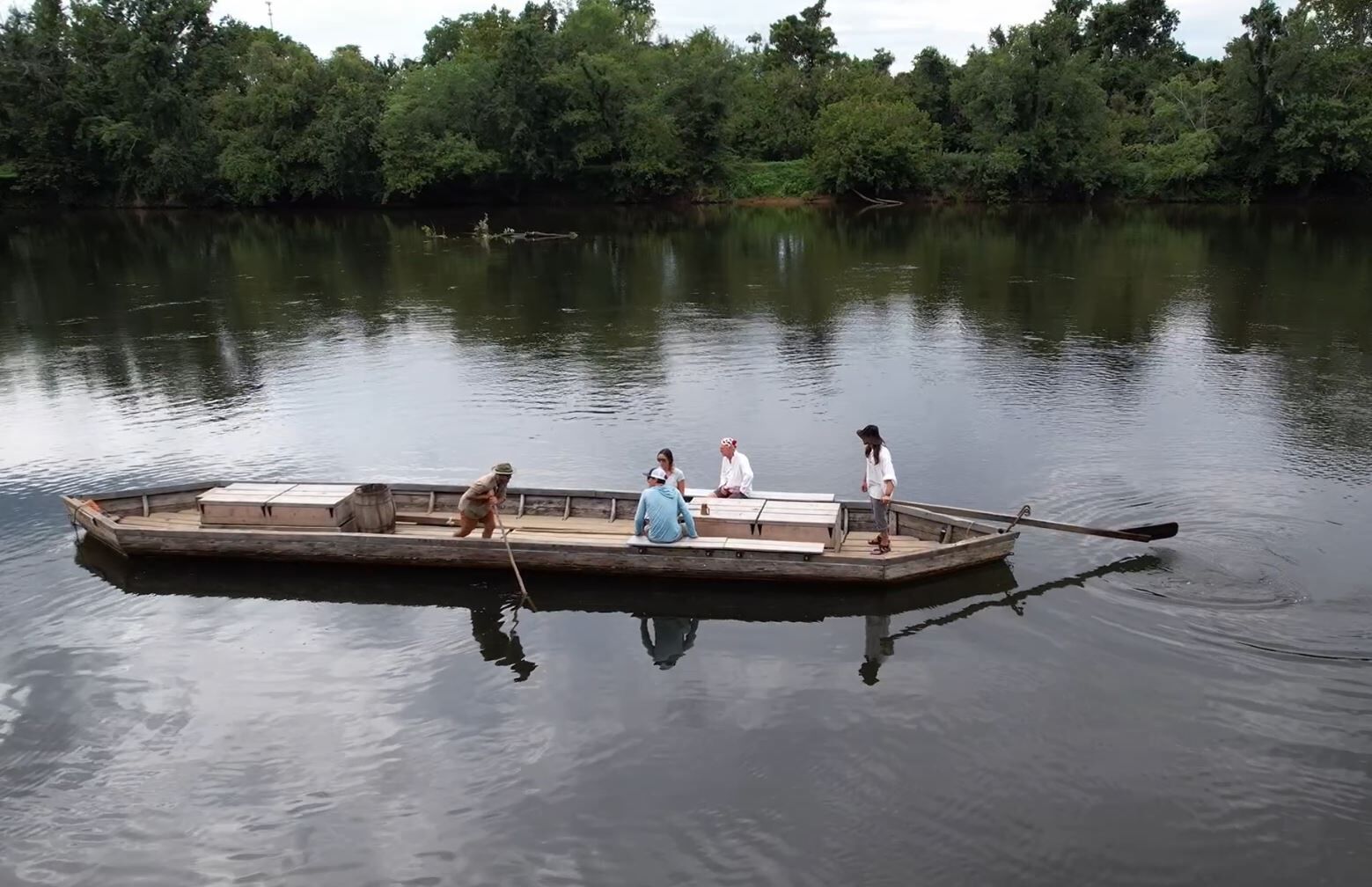
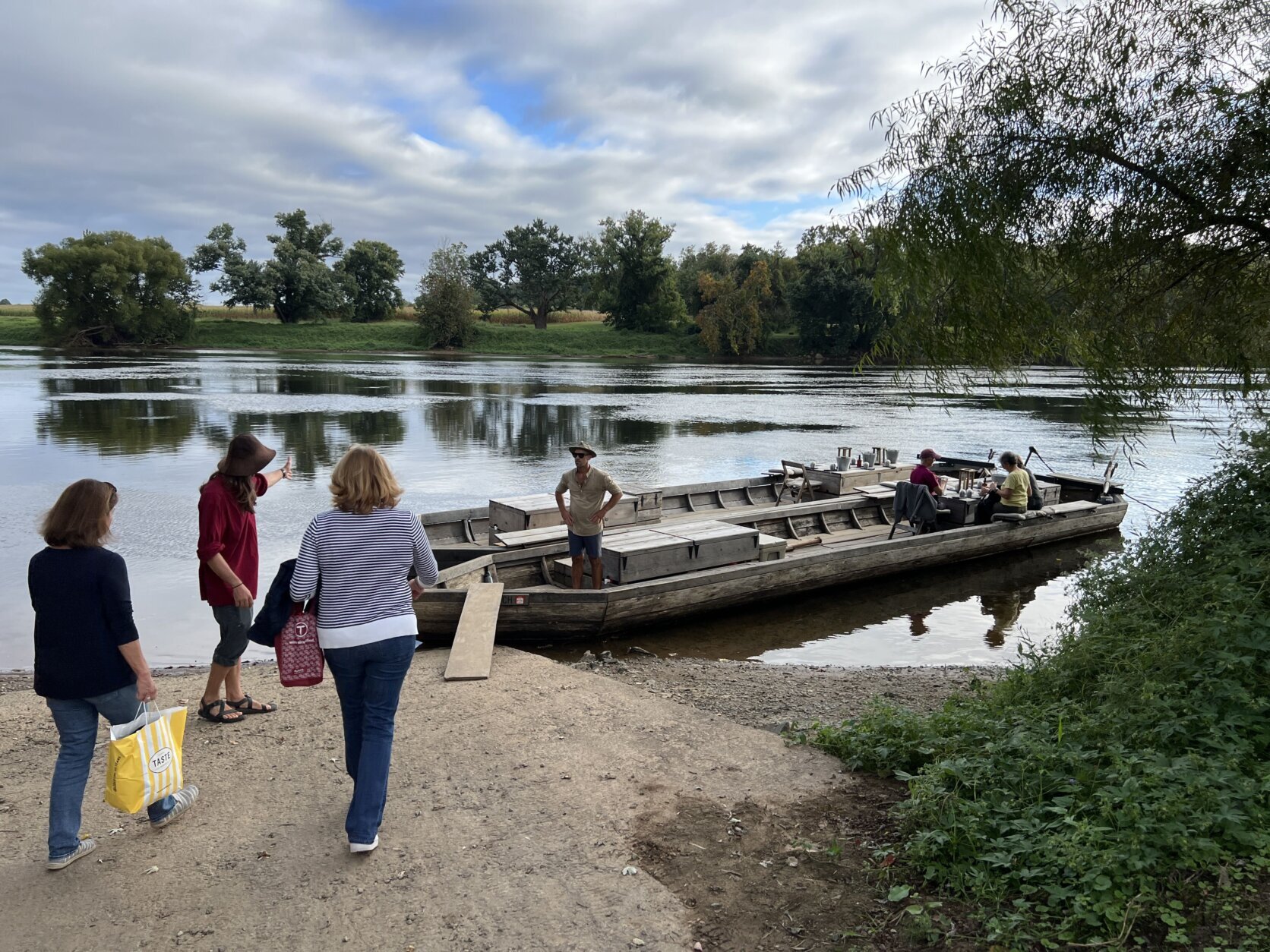
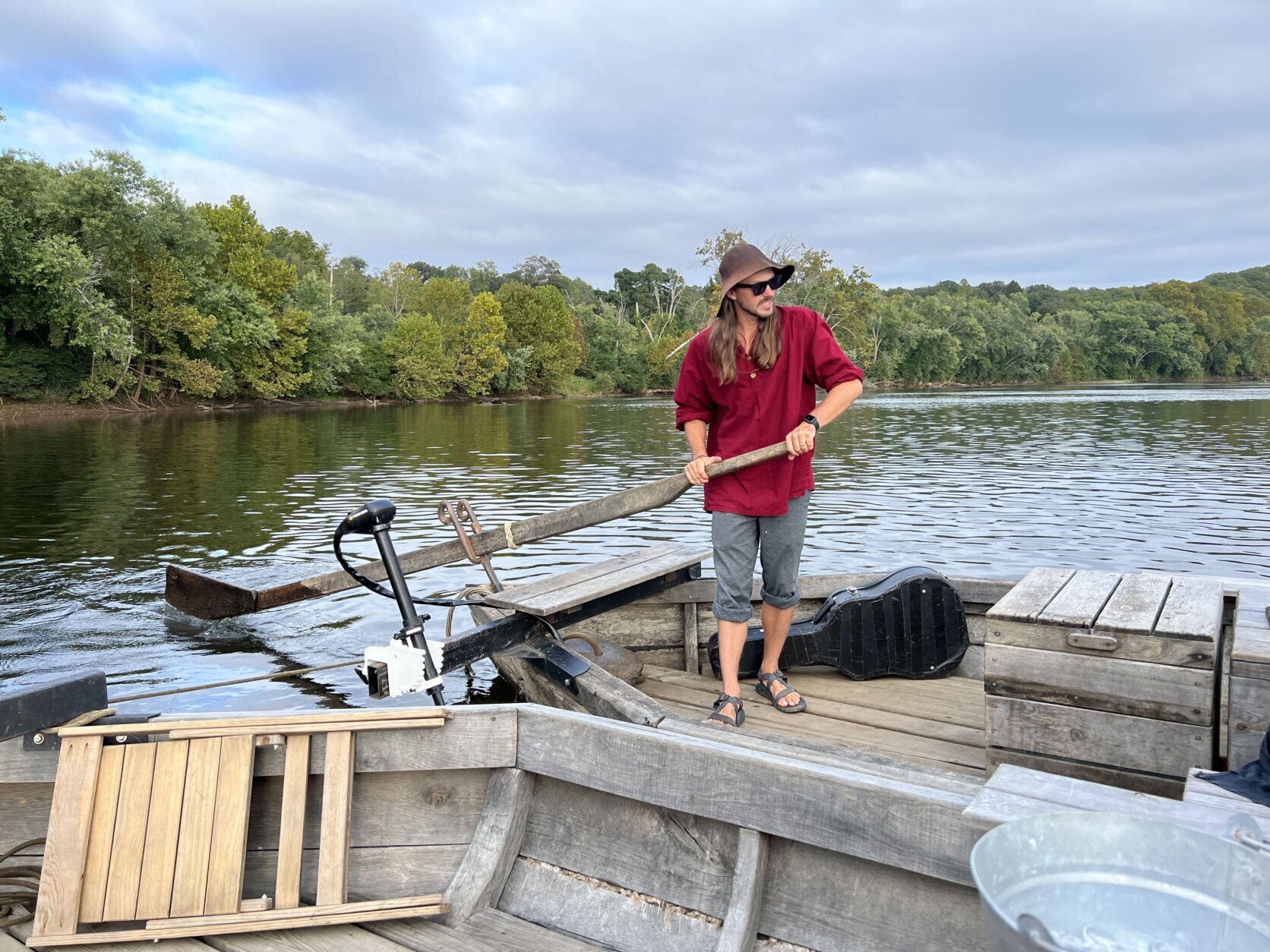
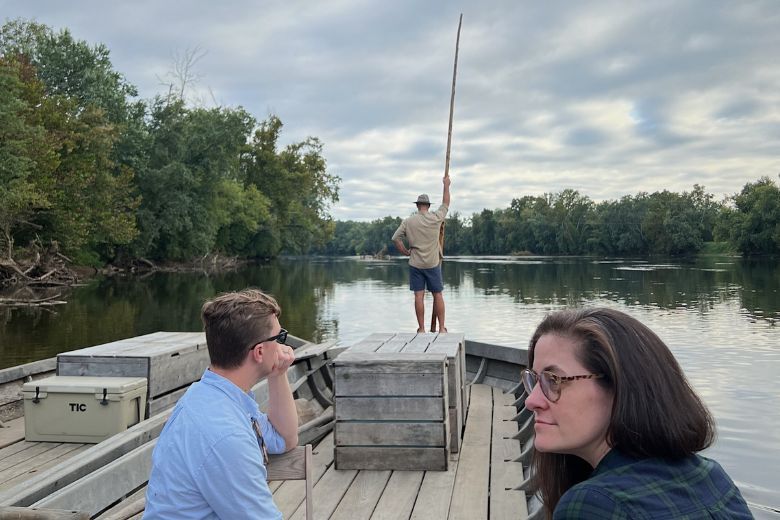
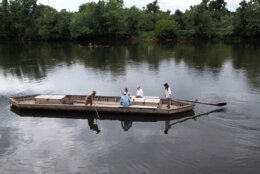
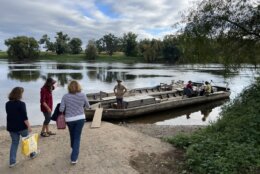
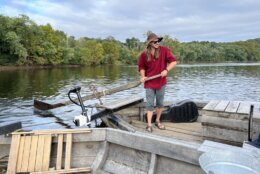
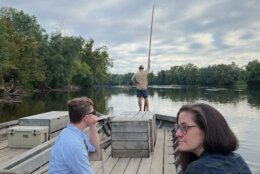
How the batteau ‘transformed’ Virginia
The batteau was invented in 1775 in Albemarle County, where Smith grew up.
“These James River batteaux completely transformed the face of Virginia,” Smith said. “There was no way for people that were living in the interior of the state to sell their product, until you had a boat capable of shipping that product to the ports of Richmond.”
That was a gamechanger.
“The men that actually worked on these boats are really what facilitated all of that economic activity that kind of grew up and created the cities and towns we live in today,” Smith said.
The boatmen transported heavy loads year-round at times in tough conditions, only stopping for ice or low water. There’s no shade on board and little protection from the rain.
At times, the journey was treacherous.
The enslaved men who piloted the boats would be gone from the plantation for months at a time. As a result of their long journeys, Smith said they were often afforded more trust and independence than people working in the fields.
“Explaining their role in the settlement of Virginia’s Piedmont is a story that we want all Virginians and anyone joining our tour to know,” Smith said of the boatmen.
A century later, batteaux found buried in mud spark curiosity
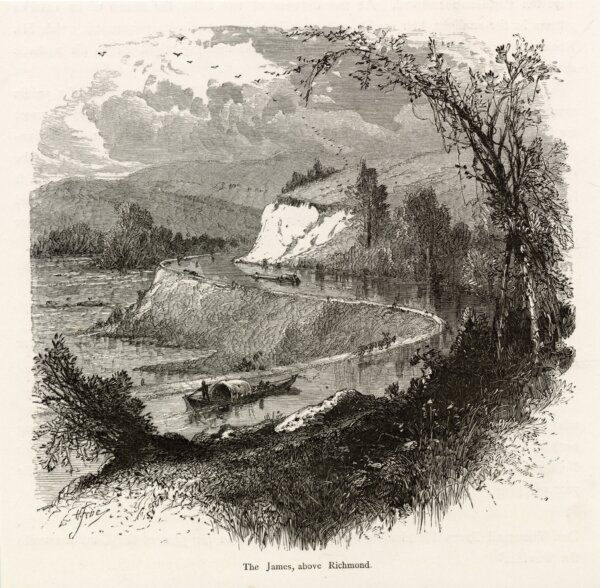
In the mid-1800s, batteaux were replaced by canalboats. With that, the history of the batteaumen largely vanished for more than a century.
“That changed in 1985, when several boats were discovered in downtown Richmond buried under the mud,” Smith said. “These boats sparked a resurgence and an interest in batteaux.”
The discovery of the vessels led to the first ever James River Batteau Festival later that same year. During the yearly event, groups build replica batteaux and pilot them 120 miles from Lynchburg to Richmond on a similar route as the batteaumen did 200 years ago. Hundreds of people in kayaks and canoes join on the eight-day journey with around 10 to 15 handmade batteaux.
In some spots along the river, including Scottsville, people crowd along the river when the group arrives and departs.
The festival is how Smith tipped his toe in batteau.
“My father built his first boat the year I was born in 1987,” he said. “I grew up coming down to the batteau festival and floating on the boat for a day.”
As teenagers, the Wills got involved in the festival. Smith captained his first boat in 2006, the year after he graduated from high school.
“We were the only ones on planet Earth floating down a batteau,” he said. “It was just about as unique as anything you could get involved with.”
After nearly 20 years of navigating the James, the men started giving batteau tours in 2022.
Connecting the dots in Va. history
The tour, Smith said, “connects the dots” between the role of tobacco and the settlement of the Piedmont for attendees.
Most people they come across don’t know much, if anything at all, about batteaumen. Some of that, Smith said, could be attributed to the sheer volume of Virginia history.
“I’m standing here in Scottsville, Virginia,” he said. “You drive 25 minutes up the road, Charlottesville, and there’s Monticello. Virginia, especially 17 to 1800s Virginia, just has a massive amount of history to cover.”
That’s the “generous” way to look at it, he said, but another explanation has more to do with the subjects of the stories.
“These being enslaved African Americans or freedmen of that time, we don’t have a lot of their stories that we end up celebrating as much in Virginia,” he said. “I think the fact that this was their story is one reason it’s been forgotten.”
That vision resonates with Virginians like the former mayor Gill, who was first exposed to batteaux upon moving to Scottsville in 1999 — but she said the tour gave her a more in-depth understanding of the James River’s role in Virginia’s settlement.
“It was a verbal history and almost a re-enactment of that history that brought the lessons home for me,” she said of the tour. “We really need to pay attention to our history, and what got us to where we are today. They tell that story about central Virginia so well.”
Get breaking news and daily headlines delivered to your email inbox by signing up here.
© 2024 WTOP. All Rights Reserved. This website is not intended for users located within the European Economic Area.








